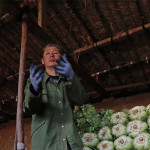LESSONS FROM CHINA’S EXPERIENCE & RESPONSE TO COVID-19
July 28, 9:30 – 10:45 AM (EDT)
What are the short- and mid-term impacts on Chinese small and medium enterprises, villages and rural households, vulnerable groups, and food value chains?Detail... Source: IFPRI Pakistan – Pakistan Strategy Support Program
Gender, crop diversification, and nutrition in Myanmar’s Dry Zone
Agriculture is a potential pathway to improved nutrition, and the need for investments that boost agricultural production, keep prices low, and increase incomes is undisputable. In Myanmar, the Japan Scaling Up Nutrition (SUN) Trust Fund, the Agricultu... Source: IFPRI Myanmar – The Myanmar Strategy Support Program
Women’s empowerment in Myanmar’s agriculture
Women’s empowerment is high on the agenda of policymakers, non-governmental organizations, and other gender equality advocates. Yet, conceptualizing and measuring empowerment is a challenge. Thus, utilizing appropriate indicators is a necessary step wh... Source: IFPRI Myanmar – The Myanmar Strategy Support Program
Monitoring the impact of COVID-19 on Yangon’s peri-urban poultry farmers – June 2020
In recent years, Myanmar’s consumption of chicken and eggs has increased drastically. However, the demand for chicken suffered a double hit in 2020 – first from a salmonella outbreak in January, followed immediately by the COVID-19 pandemic. In their r... Source: IFPRI Myanmar – The Myanmar Strategy Support Program
Monitoring the impact of COVID-19 on Myanmar’s agricultural commodity traders – May 2020
Crop traders serve as the intermediary in Myanmar’s food supply chain. They form important links between farms and food processors, exporters, and other downstream actors. However, because many of these traders purchase agricultural commodities directl... Source: IFPRI Myanmar – The Myanmar Strategy Support Program
- « Previous Page
- 1
- …
- 94
- 95
- 96
- 97
- 98
- …
- 103
- Next Page »

